With 97% of employees wanting to continue working from home, remote work is still on the rise.
In this landscape, customer service representatives are among the first people to go remote because of the nature of the job.
It’s not uncommon for a role like this one to be fully remote to begin with. Thus, you should keep learning how to better manage your remote workforce, keep them engaged, and optimize their performance.
In this guide, we’re exploring the success recipes managers are using to retain their remote customer service agents and help them improve in all aspects of their work.
What are remote agents?
Remote agents can work from anywhere in the world, allowing you to expand your customer service support across multiple time zones. Another reason you might want to opt for a remote support team is that it allows you to hire the best agents in the world. In fact, the quality of the talent you hire is one of the prerequisites of remote customer service success.
Today, having agents work remotely isn’t extraordinary.
Contact center leaders are estimating that as many as 47% of their agents will work fully remotely in the future.
Winner recipe for managing remote call center agents
But opting for a remote team force shouldn’t be a burden. And it definitely shouldn’t require extra time from your end.
So we put together our best tips for working with remote call center agents and reached out to managers who are already using them to better their teams:
Build that team spirit!
Challenge: When agents work remotely, it’s hard for them to develop a social bond. This can indirectly impact their productivity and even lower their motivation.
Solution: Start by becoming a model yourself to create a sense of community among remote agents. Initiate team building events, fun meetings, check-ins on Slack, 1-on-1 meetings over lunch break, thematic Zoom calls, etc.
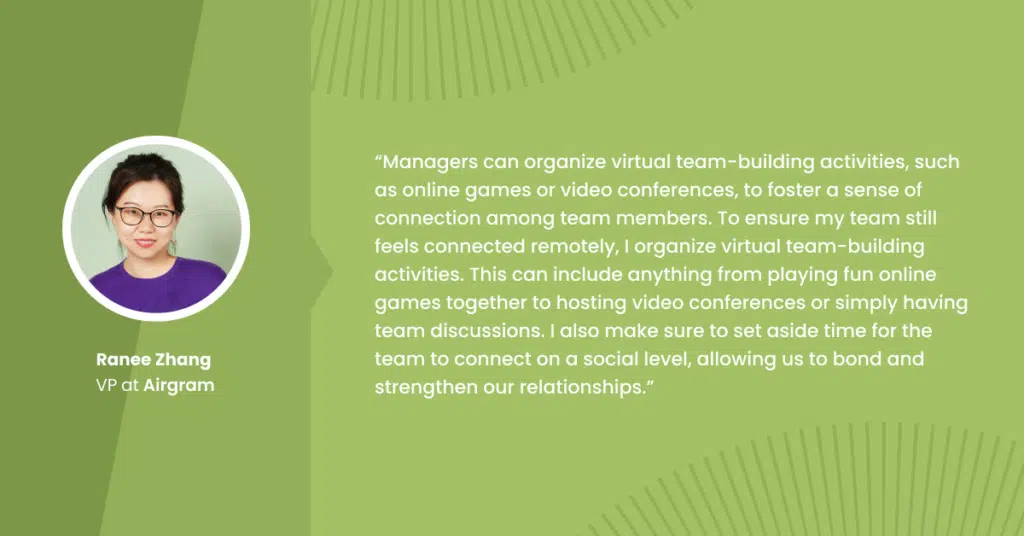
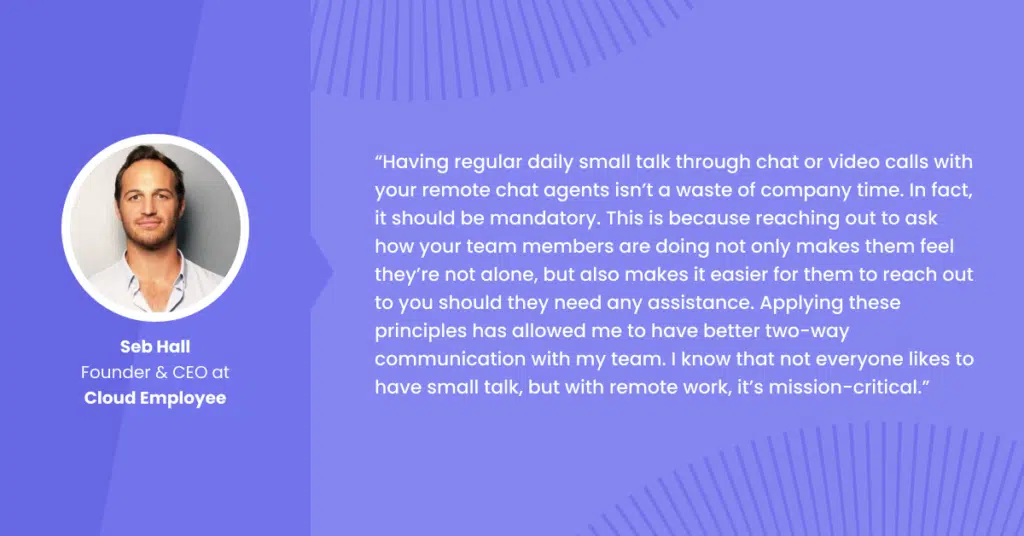
Set goals to drive their performance
Challenge: Agent performance can be below average when they’re not driven enough at work.
Solution: Set goals for them! Kaizo’s Missions let you share time-based challenges with your agents based on their past performance and priorities.
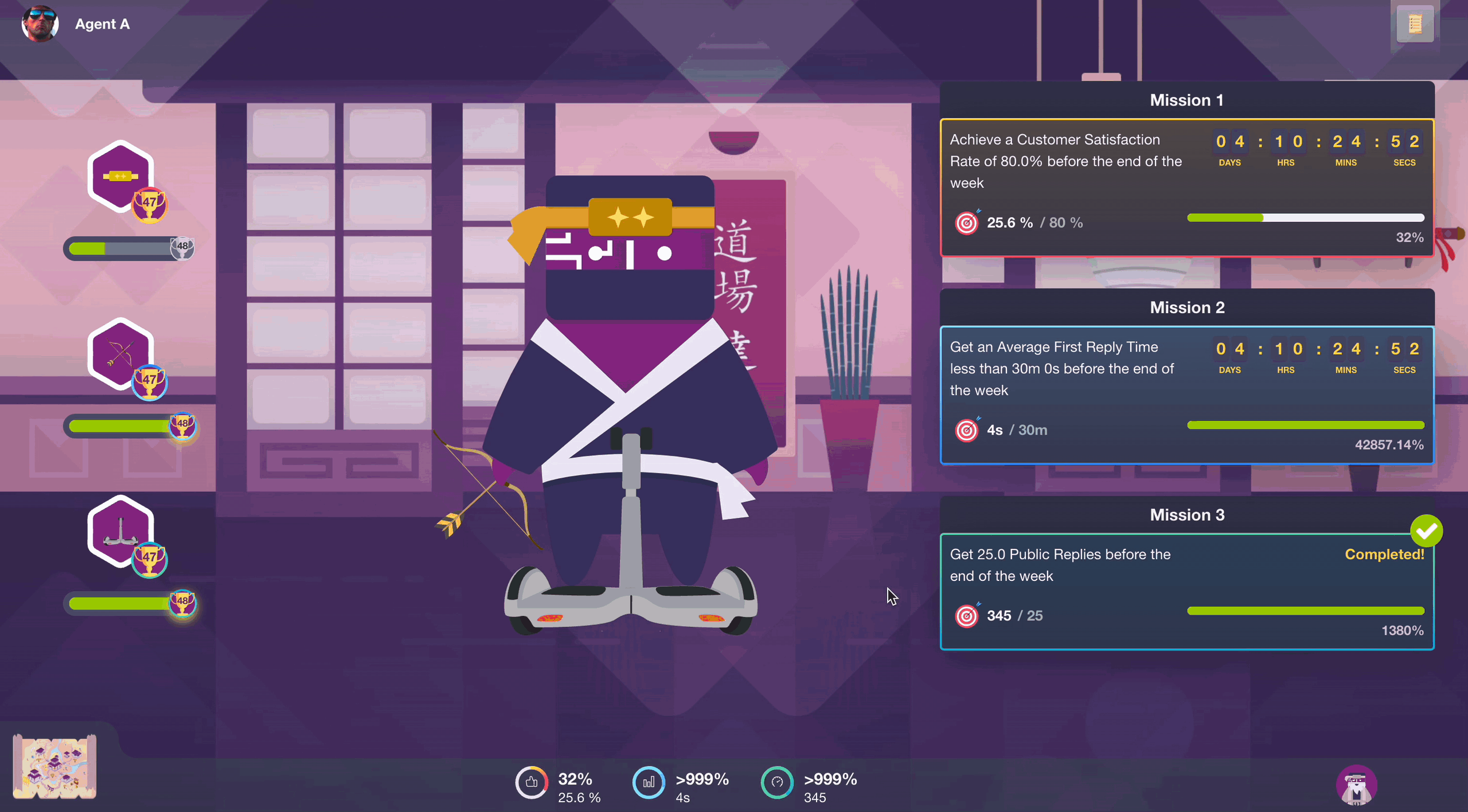
Nadezhda Zubova, Customer Support Specialist at Miro says that having effective remote agents comes down to trust and support. Focusing on long-term goals has also helped her stay motivated and confident even on bad days.
Giving your team a “mission” allows you to keep your agents focused on the most important things for them AND let them own their growth process. If you’re setting these for the first time, follow the SMART framework to prevent missing out on the details.
Provide continuous feedback and performance support
Challenge: Your remote agents aren’t feeling your support. Or, it’s not enough for them.
Solution: Give them continuous quality feedback and pair each point with an action item so they can improve based on concrete instructions and resources. Create full-fledged Missions for your team to keep them accountable and focused on what matters most.
Alice Hall, Co-Founder & Creative Director at Rowen Homes recommends making it a priority to offer frequent feedback on performance.
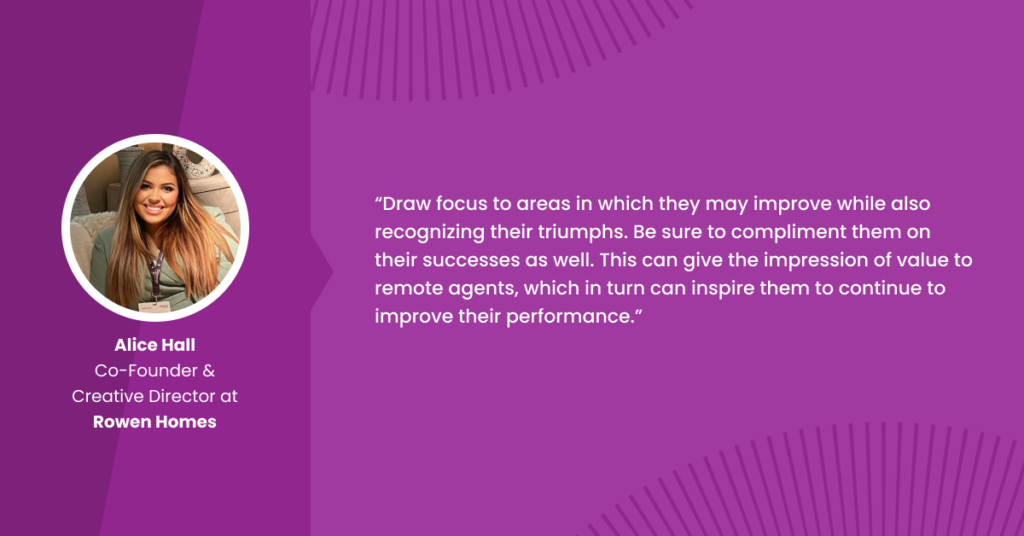
But how will you have time for everyone?
John Riordan, Director of Support at Shopify says they first train their team managers to spot behavior changes in the way employeWe es collaborate and behave. Even if this communication is only happening over a video chat tool. 1-on-1 meetings are perfect for getting a good grasp of these. Keeping the ratio of team managers to agents low (like 1 manager : 9 agents) also lets leaders have more time to meet up and support their agents.
Invest in career growth
Challenge: 60% of agents underperform because they see their roles as an in-between. A lot of them are still students, so they might see it as a temporary solution, not a long-term career.
Solution: Make it loud and clear that they can build a career in customer support and receive growth opportunities within the company. Give them all the resources they need to learn more and eventually become a pro in the field.
There are a lot of skills your support team will have to develop. To help you guide them, we talked to Heidi Elhawary, Head of User Support at Trivago, about the best traits agents should develop to build a lasting career in support. These include being empathetic, solving issues efficiently, and learning to build better relations with the teams these agents work with the most.
For managers, this means you should provide your support team with access to courses or workshops to help them develop soft skills such as active listening. And, you’ll want to consider helping your remote customer service agents collaborate better, just like they’re working on providing a better customer experience.
Above all, Heidi also emphasizes the importance of clarifying how Customer Support is a viable career path, as opposed to just a job. She connects her own success to giving a hundred percent in her entire career and taking initiative from the early stages. This is exactly what managers should support: Giving remote agents more autonomy to bring their own ideas to the table!
Bonus: Faster decision making and improved team performance!
Challenge: Inexistent or poor company values impacting decision making, hiring, and individual performance.
Solution: Re-define or adopt your company’s general set of values to guide your support team remotely.
Stephanie Wohl, Petra Hageman, and Chelsea Baker recommend building a list of core principles for three reasons:
- Having defined your customer service values helps you hire for personality fit.
- It allows for easier decision making. Whenever you have complex challenges, rely on the agreed values to make sure your final choice will get general buy-in from the team.
- It makes measuring performance fairer and faster for both managers and support agents. One of the core values Chelsea applies at Channable is ‘own it’. Each agent gets to own their interactions with customers and stay accountable for them. This allows employees to be responsible for their own performance and willingly work on improving their performance.
Note: Putting agents in charge of their own projects also keeps them engaged.
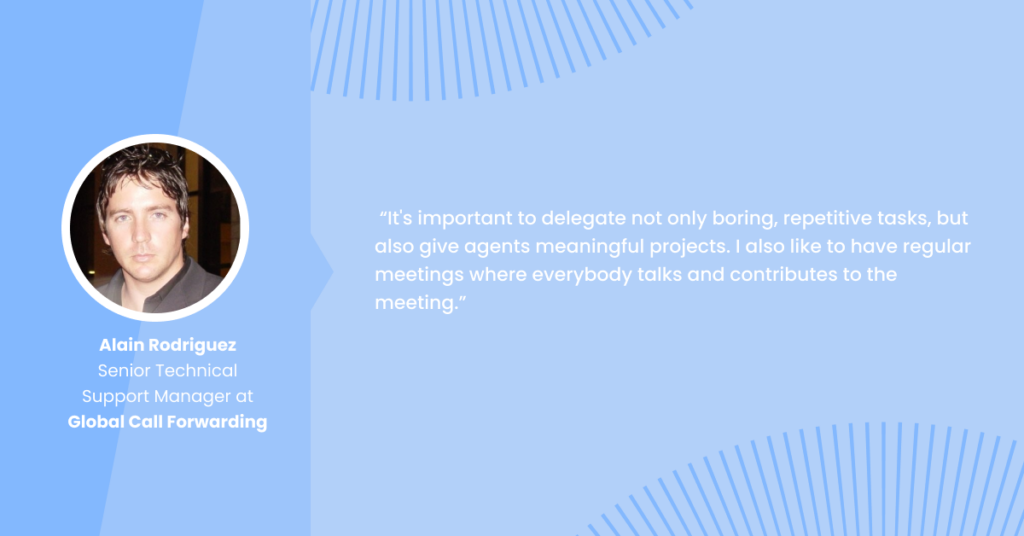
Where do you go from here?
There’s one thing all managers seem to focus on more than anything else: the relationship they have with their agents.
Whether it’s taking the time for a 1-on-1 to actually listen to them or giving them more freedom to own their work and ideas, managers should prioritize their team.
But to do this, you need to guide them and give them the right tools.
Book a Kaizo demo to see how you can drive successful outcomes for your remote chat agents team, analyze their performance, coach them, and save time on it all. All in a gamified environment!



